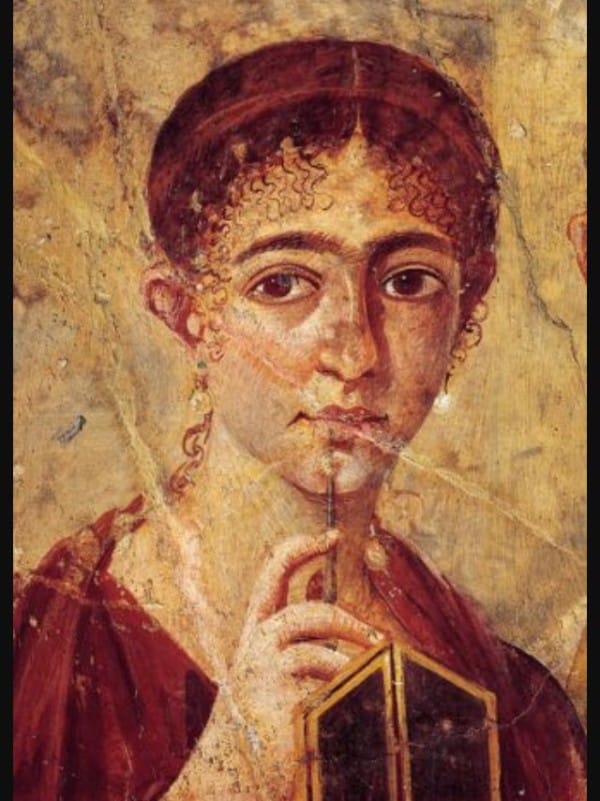[Greek] κοσμέω (kosmeō), [Latin] adornare: to order, to adorn, to put in order, trimmed, to arrange, to garnish, to decorate, to furnish, to embellish, to beautify, to dress, to make attractive, to bring to order; Mt. 25:7, Rev.21:2, 1Tim. 2:9, 1Pet.3:5, Mt.12:44, Lk. 11:25, Tit.2:10, Lk.21:5, Rev.21:19, Mt. 23:29

Prisca (Priscilla), a fellow co-worker with St. Paul, wears a unibrow, a popular Greco-Roman beauty practice
Background Information:
Greek Hellenism: This term, meaning to order, to furnish, and to adorn, is presented in a variety of uses and nuanced meanings. In various contexts, order and adornment are interconnected. In a military sense, this involved the setting of an army, the ordering of combatants, and the conscripting of countryman into the armed forces. Homer makes mention of marshalling (conscripting) tribes in occupied countries. Woman adorned themselves with jewelry and cosmetics. In Hellenism, virtues were considered the personal adornments of a person. Therefore, heroes and highly respected people were viewed as those who adorned (brought honor) to their country.
Ancient Greco-Roman Women’s Makeup: Pale skin and the “no-makeup” look were highly sought. Women painted their faces with white lead or chalk. Slathered creams of oil honey and olive oil were used as moisturizers. Red iron oxide and ochre clays were applied to lips and cheeks. Charcoal and olive oil were applied to the eyes. The unibrow was highly desired, using a dark powder to enhance and to connect the brows. Unbeknownst to those times, lead poisoning most likely lead to many early deaths!
Old Testament: Related to five other Hebrew terms, this Greek term essentially means to order, to adorn, and to arrange. Again, adorning is expressed in various ways. Preparing and arranging are connected with table settings and the Temple preparations. Adorning involve cosmetics, jewelry, clothing, metaphorical imagery, and behavior. These varied senses of adorning also continue in the New Testament. Come here, stranger, set the table (Sir.29:26). With the arranging of the sacrifices for the Most High (Sir.50:14). Shading her eyes with cosmetics (Jer. 4:30). I adorned you with jewelry (Ezek. 16:11). He also decorated the building with precious stones (2 Chr.3:6). They adorned their style of life with the good deeds of upright people (3 Macc.3:5). He would adorn with the finest offerings the holy temple which he had previously despoiled (2 Macc.9:16). Thus prides adorns them as a necklace (Psa.73:6).
New Testament: This term conveys the sense of to adorn, to trim, to beautify, to decorate, to clean up (order), and to attain an attitude of conduct. As in the Old Testament, adorning takes on various meanings. Trimming and ordering pertain to properly working wicks and cleaned up homes. Decorating and beautifying apply to women, temples, precious stones, and jewels.
Scripture:
“Slaves are to be under the control of their masters in all respects, giving them satisfaction, not talking back to them or stealing from them but exhibiting complete good faith, so as to adorn the doctrine of God our savior in every way.” Titus 2:9-10
Titus is encouraging the slaves, despite their station in life in slavery, to show Christian behavior to their masters. Adorning means assuming an attitude or code of conduct.
“But upon returning, it finds the home swept clean and put in order.” Lk. 11:25
An unclean spirit finds a home in order but brings other spirits in order to reside in this home. This contributes to this evil generation who refuse to accept Jesus. This leads to worse situations than before.
“While some people were speaking about how the temple was adorned with costly stone and votive offerings.” Lk. 21:5
The temple, an important institution for offering sacrifices, was appropriately decorated and supplied with precious stones and offerings.
Conclusion:
Cosmetics, cosmos, adorn
It is interesting to note that since ancient Greek times, there seems to be a multifaceted relationship between adorning, order, cosmetics, jewelry, and virtues. I would have never thought that this term would be used in a military sense. However, it makes sense when this involves order (discipline), virtues, and heroism. In ancient Greek thought, virtue was considered an adornment of one’s character. This term’s sense of order also is associated with the universe (cosmos).
It would make sense that this term would be used in preparing and furnishing the temple. It is interesting to note that there is explicit mention of cosmetics in the Old Testament. However, I think it is much more significant to note that adorning can also mean taking on an appropriate attitude or code of conduct. Perhaps, this value derives from Hellenism.
It is interesting to discover that this term would be used in trimming and cleaning. Perhaps, this idea is tied to the idea of having order. In regard to codes of conduct, slaves, in spite of their captivity, were still encouraged to show respect, befitting of Christians, to their masters. Rev.21:2 shows a new Jerusalem prepared as a bride adorned for her husband. This images the marriage relationship between God and man.
Now there exists a multi-billion dollar cosmetic industry, accommodating both women and men. In a sense, human nature remains constant. As in the past, the current cultural norms generally shape cultural attitudes (such as attractiveness) and uses for cosmetics.
